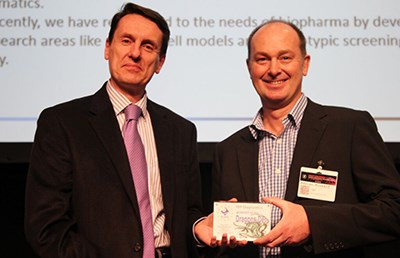[Pictured: Adrian Kinkaid receiving an award for the Dragon’s Den competition at the ELRIG Drug Discovery Conference, held in September 2015.]
MIP Diagnostics Ltd, a spinout from the University of Leicester developing plastic antibodies for a variety of applications, has received follow-on investment from Mercia Fund Management (Mercia), a leading investment business in UK innovation and wholly-owned subsidiary of Mercia Technologies PLC.
The investment, totaling £300,000, follows the successful completion of key milestones, including the appointment of CEO Dr Adrian Kinkaid, and the development of an initial sales pipeline. One year into operations, MIP Diagnostics has managed to secure customers and is in initial discussions with several blue chip organisations.
MIP Diagnostics will use Mercia’s latest funding to build momentum for its current fee-for-service business strategy. It will also continue to raise awareness of the advantages of MIPs, particularly in its initial target markets of pharmaceutical research & manufacturing, biotechnology, nutrition, security, environmental monitoring and academic research.
Dr Adrian Kinkaid, who was appointed CEO of MIP Diagnostics last June, said:
“We are pleased to receive further investment from Mercia which, alongside the Technology Transfer Team at the University of Leicester, has been a great support as we expand operations and secure initial customers.
“We will now work towards increasing this momentum by building our sales pipeline and, in the longer term, expanding our team.”
MIPs (Molecularly Imprinted Polymers) are alternatives to traditional antibodies made from polymers and synthesised by a novel method developed by Professor Sergey Piletsky, Professor of Bioanalytical Chemistry at Mercia’s university partner, the University of Leicester.
MIPs solve the current challenges inherent in the use of antibodies and aptamers. Traditional antibodies are vital tools for drug discovery and point-of-care diagnostics, but they are frequently unreliable due to their fragility and propensity to biodegrade. Furthermore, in order to work successfully, antibodies need to bind to the target using a predetermined scaffold of fixed dimensions.
MIPs, on the other hand, are not biodegradable and are constructed by a process of self-assembly using the target molecule as a template. This also makes them more readily available, in many cases taking two weeks or less to make. Being polymers, they are also very robust and thus able to withstand extremes of temperature and pH. Additionally, MIPs can now be designed to incorporate other properties depending on their application. For example, a MIP can be developed with magnetic properties to facilitate purification or made to be florescent for easier detection.
MIPs already have the potential to disrupt the use of antibodies and aptamers to become a core part of an increasingly high-value sector with significant market opportunity. The research reagent market alone is currently valued at $2.4bn, with research antibodies contributing around one third of the value, according to Pivotal Scientific Ltd.
Dr Nicola Broughton, Mercia’s Head of Technology Transfer, has worked closely with MIP Diagnostics since its foundation in 2015. She said:
“We are pleased to invest further into MIP Diagnostics, which has experienced significant advances since Mercia’s SEIS investment from its third party funds last year.
“We believe that there is significant value to be unlocked from replacement antibody products in a variety of markets and the company has the ability to build a range of proprietary products that it can sell and then licence to bring in higher revenues and, ultimately, a larger exit value.”
